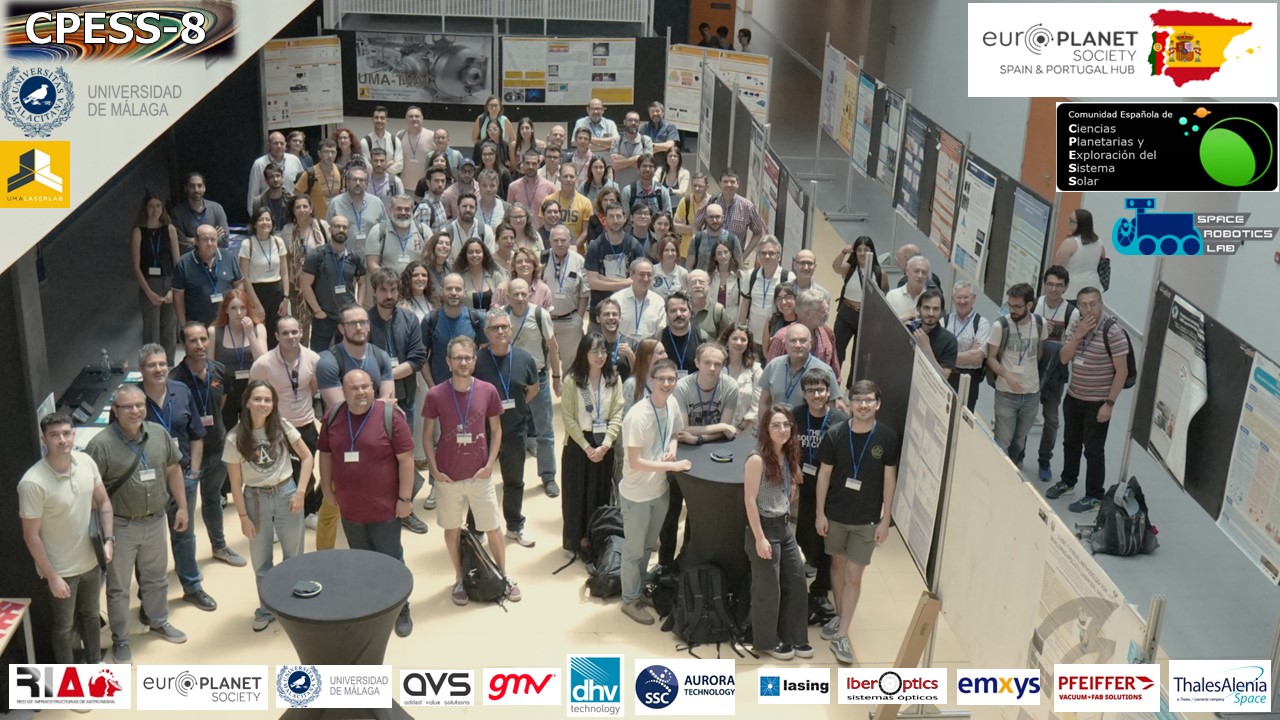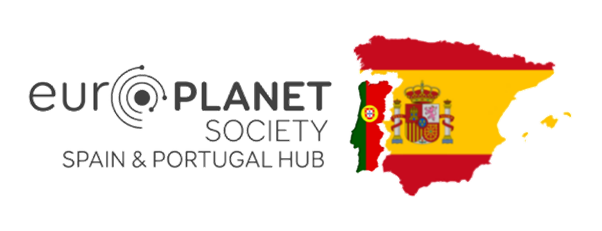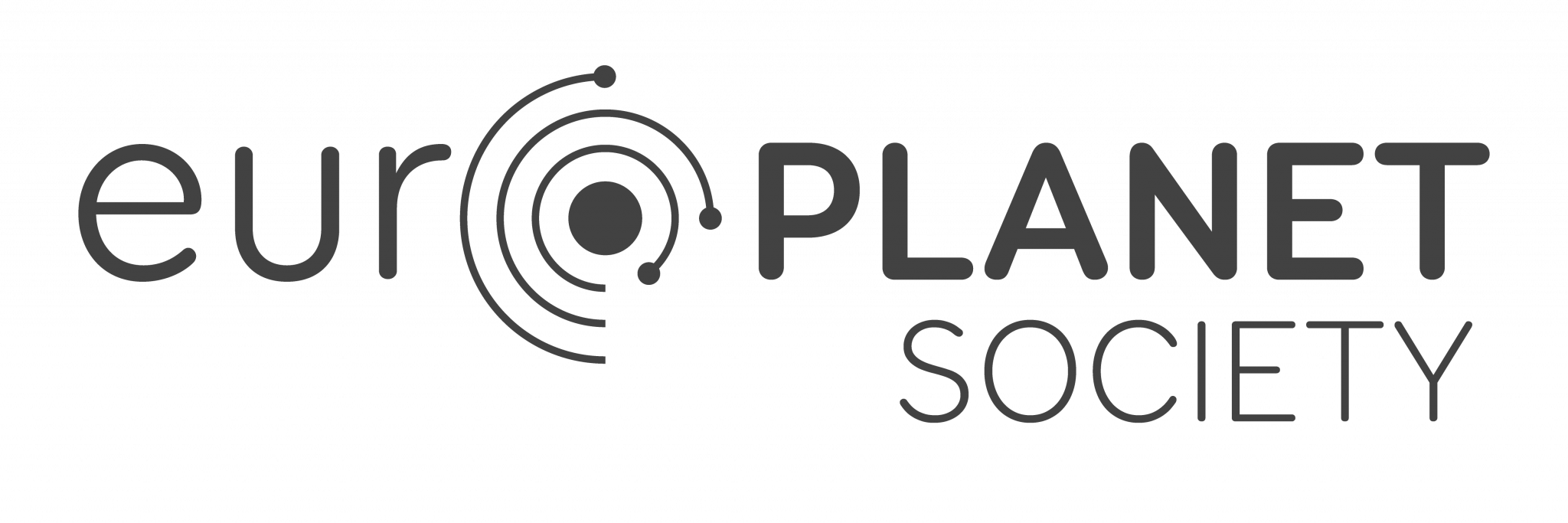Industry
& Stakeholders
Facilities
Ground Based Telescopes
Planetary Sciences
in Spain and Portugal
Professional
Community
Scientific
Conferences
Join
Europlanet Society
Outreach
Activities
Members
Europlanet Society
Amateur
Community
Networking
Hub Activities
Europlanet Iberian Hub
The VIII Planetary Science & Solar System Exploration Congress (CPESS-8) took place in Malaga from 26 to 29 May 2025, organized by the LaserLab & Space Robotics Lab teams at the Faculty of Engineering of the University of Malaga, in collaboration with the Iberian Planetary Science Community and the Iberian Node of the Europlanet Society.
Congress was a great success with >170 participants and >120 scientific contributions.

During the congress we discussed the current situation of Planetary Sciences in the Iberian Peninsula, with a special focus on opportunities for scientific, technological and industrial collaboration at an international level, especially in Ibero-America, with special invitation to representatives from Portugal and Latin America.
Sponsors
SCIENCE PROGRAMME
(web / download)
- Monday 26 May 15:00-19:30 : Science Policy & Missions
- Tuesday 27 May 9:30-18:30 : Space Instruments & Terrestrial Planets
- Wednesday 28 May 9:30-18:30 : Small Bodies (Asteroids, Comets, ...)
- Thursday 29 May 9:30-17:00 : Giant Planets, Astrobiology, Exo-planets, ...
Full abstracts available in PDF
The programme included sessions on scientific policy with representatives from the Spanish Space Agency and State Research Agency, a strong presence of the Space Industry, and sessions dedicated to scientific and technological contributions from planetary research groups from the main public institutions.
The programme will also include round tables on science-industry synergy, debates on IberoAmerican collaboration, events in support of the new generation of early-career researchers, collaboration with amateur astronomers and various public outreach events, which will enhance the accessibility and visibility of the event and achieve a greater impact on society.
Oral presentations & posters
Venue
The congress took place at the Faculty of Engineering of the University of Málaga, metro stop "Paraninfo".
Hotel accommodation is recommended along metro line 1, anywhere between the University campus or towards Malaga centre (Atarazanas).
Student accommodation is organized at Residencia LIVENSA, 10min from Barbarela metro station.
Social Events
- Monday 19:30: Welcome Cocktail
- Tuesday 18:15: Demo UMA SpaceRobotics Lab
- Tuesday 20:00: Pint4Science Junior at Molly Malone
- Tuesday 20:30: Sunset Boat trip by Mundo Marino
- Wednesday 19:30: Exhibition 50 años de Astronomía en Málaga (Ámbito Cultural El Corte Inglés)
- Wednesday 21:00: Dinner/Cocktail Patio de Beatas (30€ TBC)
Key Dates
- 1-14 March 2025: Deadline for Abstract Submission and Student Travel Grant requests
- 21 April 2025: Confirmation of accepted contributions
- 24 April 2025: Registration form
- 9 May 2025: Programme Confirmed
- 22 May 2025: Webinar on Asteroid Observations, in collaboration with IberoAmerican Space Agency Network
Science Organizing Committee
- Paula Benavidez UA
- Alejandro Cardesín Moinelo ESAC
- Isabel Perez Grande / Eva Díaz Catalá AEE
- Marina Diaz Michelena AEI
- José Miguel Vadillo UMA
- Guillermo López Reyes UVa
- Teresa del Río UPV/EHU
- Alvaro Álvarez Candal IAA
- Isabel Herrero CAB
- David Morate CEFCA
- Daniel Toledo INTA
International Committee
- Carlos García Sacristán, AEE International Relations
- Michael Kuppers, European Space Agency
- Noemi Pinilla, UniOvi & University of Central Florida, USA
- Julia De León IAC & Europlanet Society
- Pedro Machado IA-Lisboa, Portugal
- Fernando Roig Observatorio Nacional, Brasil
- Marcela Cañada CONICET-UNSJ, Argentina
Organizing Committee
- Jose M. Vadillo UMA LaserLab
- Laura García Gómez UMA LaserLab
- Carlos Perez del Pulgar UMA Space Robotics Lab
- Paula Benavidez UA
- Alejandro Cardesín Moinelo ESAC
The Europlanet Spain & Portugal Hub is the Iberian node of the Europlanet Society. Its main objective is to support the Spanish and Portuguese planetary science community, promoting the collaboration between all scientific and technology development institutions and research groups, reinforcing the participation of Iberian scientists and engineers in national and international space research programmes.
Spanish and Portuguese planetary science community
The Iberian Planetary Science Community has over >400 members, planetary researchers and engineers, distributed accross >70 research groups, and >30 institutions.

The Europlanet Society is an international association with the purpose of promoting planetary sciences, solar system exploration and any other related field for the benefit of the planetary science and technology development community, by encouraging the creation of new knowledge, promoting education, stimulating innovation, and enhancing accessibility and transparency. The Society is the parent body of the Europlanet Scientific Congress (EPSC), the largest annual meeting on planetary science in Europe.
The Europlanet Spain & Portugal Hub Coordination Committee is composed by:
- Chair: A. Cardesín Moinelo (ESAC)
- Vice-Chairs: R. Hueso (UPV) / P. Machado (IA-Lisbon)
- Secretary: S. Fernández Menéndez (UniOvi)
- EPS Board Representative: J. De Leon (IAC)
- Representative Spain: P. Benavidez (UA)
- Early Career SP: D. Morate (CEFCA)
- Policy Officer SP: N. Pinilla (UniOvi), I. Pérez Grande & E. Díaz Catalá (AEE)
- Industry Officer SP: A. Catalán (PAE)
- Representative Portugal: P. Machado (IA-Lisbon)
- Early Career PT: J. Dias (IA Lisboa)
- Outreach & Comm. PT: M. Roos (LightCurveFilms)
- Amateur Community : J. Álvaro (FAAE/AstroCuenca)
- Diversity Officer: L. Parro (UA)
- Space Ethics: J. Hdez-Bernal (UPV/LMD)
- Instrumentation & Tech. Dev.: A. Moral-Inza (INTA)
- IberoAmerica: P. Benavides, A. Cardesin, R. Duffard, D. Morate
The Europlanet Iberian Hub is proud to announce the winners of the early-career prizes for best planetary thesis in Spain & Portugal in 2024:
"Abraham Zacut" Award
|
|
Dr. Eloy Peña Asensio
|
|
"Pedro Nunes" Awards
|
|
Yuri Damasceno
|
|
| |
Rafael Silva
|
These awards are named after historical astronomers from Spain and Portugal, who lived and worked in both countries, serving as role models of Iberian synergy and collaboration. Their astronomical and instrumental contributions played a key role in the maritime navigation era and enabled historical discoveries of planetary importance.
We thank all the candidates for their participation and for the high quality of the works presented in this competition, which we hope will serve as motivation for the new generation of planetary scientists and engineers in Spain and Portugal.
The Europlanet Iberian Hub is proud to announce the winners of the Europlanet Iberian Solar System Amateur Astronomy award, shared ex-aequo between:
Moisés Portillo
for his outstanding contributions to the Planetary Science community, advancing the boundaries of high-spatial resolution imaging of Solar System objects
The award recognizes Moisés Portillo's long career of observing planetary objects, both individually and using entirely amateur equipment, and his notable contributions to various fields of planetary astrophotography. These contributions include monitoring the meteorological activity of Jupiter and Saturn, the first amateur detection of a volcanic eruption on Jupiter's moon Io, and monitoring the brightness variability of the planet Uranus, combined with observations taken by NASA's New Horizons space mission. Furthermore, Moisés has contributed to the study of dust storm activity on Mars and to the study of the atmosphere of Venus and the observation of its surface. The award from the Iberian node of the Europlanet Society recognizes the combination of his individual contribution and his collaborative and open spirit, which has led him to support the observations of many other amateurs, personally contributing numerous observations to professional image databases. Thanks to his tenacity and experience, many of his images achieve a spatial resolution that is enviable even by professional means.
Agrupación Astronómica de Sabadell
for their large and exemplary contribution to the Ariel mission, combining observations of transiting exoplanets with a variety of amateur and professional telescopes.
The Sabadell Astronomical Association's group of observers has made numerous observations of exoplanet transits, allowing them to accurately determine the orbital characteristics of many exoplanets of interest for the characterization of their atmospheres, which will be carried out by the European Space Agency's Ariel space mission starting in 2029. Ariel observations from space require a prior characterization of their orbits and occultation times, a task in which the Sabadell team has played a prominent role, participating in a whole series of observations with professional telescopes such as the IAC80, the Carlos Sánchez Telescope, the Joan Oró Telescope, and the 1.23m telescope at the Calar Alto Observatory. Initially in collaboration with the Europlanet project and its Europlanet Telescope Network, and subsequently collaborating directly with the staff of various observatories after confirming the quality of the observations made. The Sabadell group has demonstrated that it is possible to achieve a professional level of observation from an amateur perspective thanks to the dedication and excellence of its members. Their observations have been incorporated into multiple scientific publications for the Ariel mission, where they are a key member of the ProAm ExoClock project, in which amateur astronomers from around the world participate.
We thank all the candidates for their participation and for the high quality of the works presented in this competition, which we hope will serve as motivation for the amateur astronomy community in Spain and Portugal.






